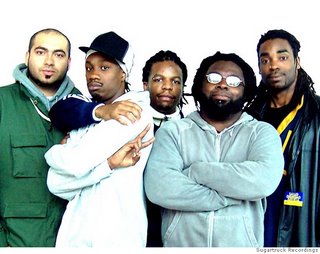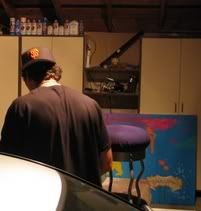
Photo Credit: Sugartruck Recordings.
One of the topics that came up occasionally in the interviews for my book is homosexuality and its role in Hip-Hop culture. The following is an article by Lisa Hix that I found in the SF Chronicle about a bunch of rappers who happen to be gay, don't want to dodge the issue, and apparently aren't too shaby.
***
Deep Dickollective
Oakland gay hip-hoppers started out by mocking spoken-word community, but now they're serious about excelling at craft
Lisa Hix
Thursday, June 22, 2006
With a name like Deep Dickollective, you would expect this Oakland gay hip-hop group to stimulate the nether regions. While they do perform playful rhymes about cruising the Ashby Flea Market, the emphasis here is on deep, as in stimulating the frontal lobe.
As with conscious hip-hoppers Blackalicious or Hieroglyphics, D/DC raps intellectual diatribes designed to challenge lazy thinking about race, homosexuality and identity.
D/DC's Juba Kalamka explains the name: "We didn't want to be coy. We didn't want anyone to be able to get around queerness, to get around sexuality or race. We wanted that to be foreground, we didn't want them to make any mistake when they were listening to it."
Kalamka, an early member of the influential '90s crew Rainbow Flava, is considered a godfather of the "homo-hop" movement, although he wouldn't say so. When Kalamka, Tim'm T. West and Phillip Atiba Goff, all academic types, formed Deep Dickollective in 1999, it was originally a scathing send-up of the pretense of the spoken-word community. But D/DC quickly became a serious hip-hop venture, and now features Kalamka, West, Jeree Brown, Rashad Pridgen, Leslie Taylor, Ryan Burke, Baraka Noel and Marcus Rene' Van. Kalamka credits the evolution of the Internet for bringing the homo hoppers together: All the queer boys and girls practicing rhymes alone in their rooms suddenly had a way to connect with one another, through Judge Muscat's Phat Family listserv, Mistermaker's GayHipHop.com and even MySpace. And a nationwide scene flourished, including Deadlee, Johnny Dangerous and the Bay Area's Katastrophe and JenRO, who would meet at Oakland's Peace Out festival. Alex Hinton chronicles the evolution of this tight-knit circle in his film "Pick Up the Mic," screening at the Frameline Festival at the Castro tonight.
It seems like an obvious irony to rhyme about gay pride in a genre dubbed misogynistic and homophobic, but Kalamka says that's making hip-hop and black culture the scapegoat for all our social woes. After all, most musical styles -- rock, punk, jazz, country, etc. -- have a history of hate.
"Queer hip-hop in a lot of ways is killing the bogeyman in the gay community," Kalamka says. "If you talk about gay, white upper-middle-class men ... they have had a convenient kind of bogeyman for a long time in the threatening straight hetero-normative black male. It's just kind of an easy and lazy event for classism and racism.
"But the truth be told, hip-hop doesn't create public policy. Hip-hop didn't create the Defense of Marriage Act. Hip-hop didn't create the climate in which kids like Sakia Gunn, Matthew Shepard, Brandon Teena and Gwen Araujo (are killed). That's not a new thing: The ills of society getting laid at the feet of disenfranchised people."
****
www.deepdickollective.com

No comments:
Post a Comment